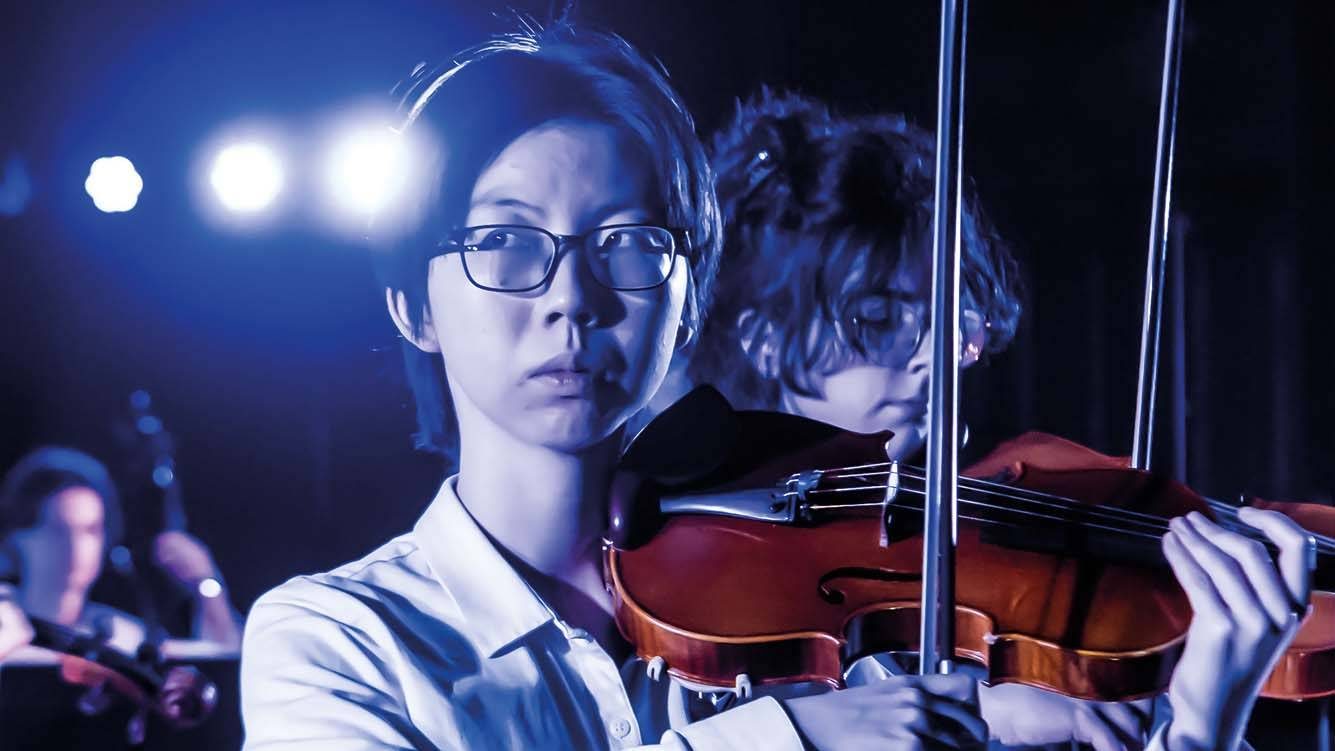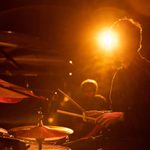
BMus (Hons) Music with Integrated Foundation Year
Course details
Introduction
The music industry is an ever-evolving landscape. How will you shape it? Our undergraduate degrees in Composition, Performance, and Jazz with Integrated Foundation Year provide you with an additional, preliminary year of conservatoire training, preparing you for successful study on the BMus degree.
The course is designed to give you the tools you need to define your artistic voice and use it to lead the arts beyond convention.
Key Features
During the Integrated Foundation Year, your training will be rooted in studio and practice-based activity, developing foundational skills required by the contemporary profession with a focus on Western Art Music. By the end of the year, you will be able to perform and / or create music as an instrumentalist, vocalist or composer at a level appropriate for entry to the conservatoire BMus course. Your individual artistic voice and personality will be consolidated as appropriate to a range of performance settings. The course will provide you with a broad skill set suited to diverse further training routes in music. You will maintain a personal development portfolio of key documents in your progress and will have termly tutorials to review and discuss these documents. Enhancing your instrument / vocal performance will also be a priority, with 1-1 lessons, departmental classes, performance workshops, audition classes, and more. You will participate in CoLab and your academic study will be refined through a critical thinking seminar and the Music, History, Society module.
During the undergraduate degree in Composition, Performance, and Jazz, your training will be centred around practical learning with a curriculum designed to develop your curiosity, professional skill set, and understanding of the contemporary world and music’s place within it.
At Trinity Laban, you will advance your technique and musicianship through individual and group tuition, and many diverse performance opportunities. Alongside recitals and building your experience in small and large ensemble contexts, you will have the opportunity to collaborate in multi-artform projects and present your work to a range of audiences.
You will be immersed in an inspirational community of global arts creators, from fellow students and staff, to visiting artists, ensemble directors and lecturers, creating the space for you to explore and challenge your artistry, and grow your professional network.
The demands of the profession are diverse, which is why your training here goes beyond traditional music education. You will develop entrepreneurial and business skills, learn how to look after your health and wellbeing as a musician, and establish robust learning techniques which will see you through your career.
Key Facts
- UCAS
- 305F
- Location
- King Charles Court
- Duration
- 5 years (full time)
- Start Date
- September
Fees
Audition fees
Please note that there is an audition fee for this course of £95 (for 2025 entry). You will also need to pay the UCAS Conservatoires administration fee of £28.50 for the 2025 entry cycle.
Downloads
Key Dates
-
Welcome Week
-
Autumn Term
-
Spring Term
-
Summer Term
Detailed Information
| Year of Study | Credits | Weighting |
| Year 0 | 120 | 100% |
| Year 1 | 120 | Pass/Fail |
| Year 2 | 120 | 10% |
| Year 3 | 120 | 30% |
| Year 4 | 120 | 60% |
Modules (Foundation Year)
-
Group Music Making Foundation focuses on the core technical and artistic training required for instrumental and / or vocal group work at foundational level. The module is designed to foster the skills and musicianship of individual learners to provide a secure foundation for group music making on the BMus course. You will learn through small-group tuition and rehearsals, non-directed and directed group work, departmental classes, CoLab projects, and visits from guest artists.
-
Dance, Film, Narrative Foundation is designed to find creative ways for composers to engage with issues surrounding composition for other art forms, particularly contemporary dance and film. This module introduces the relationship between narrative and abstraction in music, and how these help other art forms to function. It provides an overview of key movements in contemporary dance, explores contrasts between musical trends in Hollywood and other film genres, as well as considering theatre, performance art, and gaming.
-
Foundation: Music, History, and Society introduces you to a range of academic skills to prepare for study on the BMus course. You will develop your ability to examine and compare historical sources, and analyse and synthesise data. Key information relating to historical periods will be discussed, and foundational analytical methods will be applied to selected genres and repertoire. You will work on small academic tasks both during seminars and personal study time. The module brings together readings, music, and other media from musicologists, ethnomusicologists, critics, sociologists, philosophers, and musicians. It investigates an array of topics from various perspectives – such as gender, race, narrative, religion and empire – to support the development of knowledge of stylistic elements in various types of music, music’s role in society, as well as the development of critical thinking, basic research techniques, communication and presentation skills.
-
Applied Musicianship Foundation supports your instrumental / vocal studies and fosters your individual musicianship. The module focuses on the development of core music skills including aural awareness, improvisation, and music theory including harmony, harmonic function, and form. The course provides a creative, practical environment, so that this learning can be related to the performance / composition modules.
-
Principal Study Foundation focuses on core technical and artistic training in instrumental / vocal music or composition. You will learn through a combination of individual and small-group tuition, departmental classes, and visits from guest artists.
For Years 1-4 Course Details, visit the BMus (Hons) page. For more course details – including teaching, learning, and assessment – please see the programme specification.
Entry Requirements
At Trinity Laban, we place greater emphasis on our own audition process than on formal qualifications. The course is designed for students considering entry to undergraduate study at conservatoire, and places are offered to candidates who demonstrate the potential to reach that level within the year.
As a guide, ABRSM / Trinity College London Grade 8 or equivalent would be the minimum expected level of entrance to the course, although this is not a pre-requisite. All applications should note that Trinity Laban will not consider applications for deferred entry. The course accepts students in all Western Art Music instruments and voice.
Applications for the course are made online through UCAS Conservatoires.
Audition requirements
- Two contrasting pieces, written for your principal study instrument or voice, no longer than 15 minutes in total.
- You may be required to take a short sight-reading and / or playing-by-ear test, but you are not expected to have prior experience of improvisation.
- Applicants unable to attend the audition in person may be considered for entry to the course by submitting a recorded audition via the Embark.
Composition
- A portfolio of between three and six compositions, submitted in advance.
- Any styles are accepted and unfinished works may be included.
- The portfolio must illustrate your ability to produce notated scores and recordings should be submitted where possible. It will normally be assessed by the Head of Composition and an additional relevant member of staff, who will then conduct an interview which will take the form of a discussion about your compositions, interest, and ambitions.
- You will also be asked to perform a prepared piece of your choice, lasting 2-3 minutes, in any style and on any instrument (including voice) and you may also be asked to improvise.
Successful applicants will be able to demonstrate the following through the application, audition, and interview:
- a level of technical competence and fluency appropriate to foundation level performance study.
- a nascent but clear artistic identity as appropriate for ongoing conservatoire study.
- the motivation for in-depth detailed development of performance skills.
- the capacity for independent, critical and reflective judgment.
- the ability to organise and communicate ideas effectively.
The Foundation Year 0 has an English language entrance requirement of CEFR B2 (ISE II – Integrated Skills in English or IELTS Level 5.5 in all 4 areas). For Student Visa purposes, the IELTs will need to be the specific IELTs for UKVI test.
Staff
Programme Leaders
-
Programme Leader
Dr Emilie CapuletDr Emilie Capulet
-
Module Leader
Dr Michelle MeinhartDr Michelle Meinhart
Melanie HenryMelanie Henry
Philip ColmanPhilip Colman
Nicola Tagoe
-
Academic Lecturer
Matthew ReganMatthew Regan
Christina Guillaumier
Janet MunroJanet Munro
Kit MasseyKit Massey
Andrew Matthews-OwenAndrew Matthews-Owen











